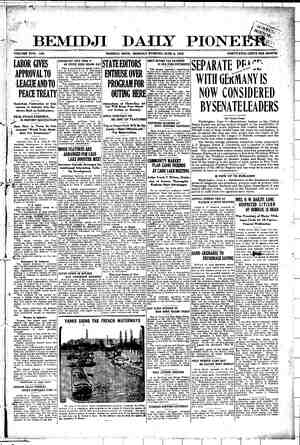The Nonpartisan Leader Newspaper, June 9, 1919, Page 3
You have reached the hourly page view limit. Unlock higher limit to our entire archive!
Subscribers enjoy higher page view limit, downloads, and exclusive features.
Nonpartigsn Tader Official Magazine of the Nafional Nonpartisan League A In the interest of a square deal for the farmers VOL. 8, NO. 23 ST. PAUL, MINNESOTA, JUNE 9, 1919 A magazine that dares to print the truth WHOLE NUMBER 194 Getting Farmers’ Program Under Way J. A. McGovern, Chief Deputy Grain Inspector, to Manage Mill and Elevator Association in North Dakota—Cities Clamoring for State Enterprises | Bismarck Bureau, Nonpartisan Leader. S SWIFTLY as possible, and yet not so swiftly as to be unbusi- nesslike, the industrial program of the Nonpartisan league is being put into working order in North Dakota. The naming of the manager of the mill and elevator association is the lat- : est step. This important office at the head of the proposed state flour mills and ferminal elevators has been entrusted to J. A. cGovern, chief deputy grain inspector of North Dakota. v No other man in North Dakota is as well trained in the grain business as Mr. McGovern. He is no politician, but is simply a man who has had years of experience in the grain business. He has been for two years assistant to Doctor E. F. Ladd, president of the state agricultural college at Fargo. In his office in the experimental flour mill on the campus Mr. McGovern has checked up on the grain buyers of the state and conducted. thorough inves- tigations of marketing’ methods. Previous to this time he was an inspector and manager at the Equity terminal elevator in St. Paul. Back of that experience is a long record as a country buyer in South Dakota. Mr.- McGovern knows the grain business from both the terminal elevator and milling standpoint and the local or country aspect. Since the enactment of the new law compelling While hailing the organization of farmers as a “class movement” and therefore very bad, ihe special inter grain buyers to pay for dockage, he has recovered large amounts of money for North Dakota farmers. There could not be an appointment that will meet better the approval of the producers of North Dakota. Mr. McGovern as a grain inspector showed himself to be a thoroughgoing servant of the peo- ple. His promotion to the headship of the new state system of mills and elevators is received as a further indication of the determination of the state administration to keep all politics out of its appointments and base them solely on merit. TOWNS COMPETING FOR STATE ENTERPRISES The next step of the industrial commission will be to choose sites for the erection of the public ° enterprises. Towns and ‘cities that for the first years of the Nonpartisan league were hostile to the whole program of public ownership are now pleading for recognition. It is realized that the localities getting ‘a state mill or elevator will enjoy a great business boom. : The importance of home industries is seen now as never before. Here again there is no opening for politics or log-rolling. In bidding for a mill, the cities know that the only test is that of ef- ficiency. The industrial commission announced that it did not wish to have trainloads of boosters com- ing to the capitol to attempt to work up empty enthusiasm for this or that site. Instead, it asked for facts. Thus it has come about that in Fargo, Grand Forks, Jamestown, Devils Lake and other cities, BLESS YOUR HEART (We CaN GET ALONG TOGEYHER — (VB N\c;m(uc AQEST A Wz committees have been appointed which have gone carefully into the advantages of their localities. Railroad facilities have been mapped out. Acces- sibility to the lignite fields of the western half of: the state is another feature that is emphasized by some. Comparative cheapness of electric power is also put forward. One city even went so far as to vote for a municipal-owned power plant so it might be able to offer a low rate to the mill. All at once the towns and villages began to , question whether they had been as progressive as they should be. Here and there representatives of the Minneapolis and other eastern corporations lost their influence in the cities. Progressive- minded men who believed.in city and state owner- ship have taken their rightful place as leaders of the community. When a city wants to put its best foot forward before the industrial commission it dwells on the opportunities it has to offer a working class popu- lation. “We have good schools,” says' one. An- other points out its paved streets, its low rents and plentiful housing facilities. . Devils Lake shows that in addition to being in the heart of the wheat- raising country it has healthful recreation spots for the workers, where they will be able to go on . Sundays and holidays for rest and enjoyment. Smaller towns are not behind in urging their case. Some say that it would be best to put the plants in a small city and let it grow naturally into an industrial center by the attraction of other en- terprises that are sure to follow. Water trans- (Continued on page 14) NATURALLY FRIENDS e —Drawn expressly for the Leader by' ‘W..C. Morris ests are doing everything they can to arouse general business as a class against the farmers. But these special interests are enemies of the independent manufacturer and the merchant in the same way. that they are enemies of the farmer. They charge all producers excessive prices for monopolized materials and services. The farmers have sought al-- with all who suffer from special privilege and naturally they have to organize themselves before they make these alliances. Farm- .- -..ets, labor, honest business—if such is a class movement, then America comes very near to being all of one class, PAGE THREE







